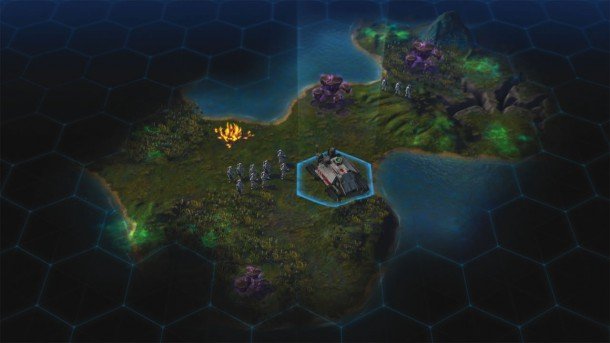Civilization: Beyond Earth interview - everything you need to know about the new factions, aliens, technology and more

PC Gamer: When you started designing this, did you design it from the perspective of looking at Civ and trying to make Civilization better, or did you think of it as redesigning Alpha Centauri, or did you think of it as creating something altogether new?
David McDonough: I grew up on the Civ games. Like you, I played Alpha Centauri until my eyes bled. When we very first got the option to make the game, to us it was making a game about the idea of Alpha Centauri, the idea of the future of humanity. That as expressed by a Civ game, we sort of figured out. Part of that was inspired by Alpha Centauri, part of it was inspired by the Civ legacy, and part of it just invented. Civ is about the history of mankind, it travels ground that everybody knows already. This game is about the future, which nobody knows, so we get to make it up. That's where I started.
Will Miller: Yeah, the influence of Alpha Centauri will be apparent, but it's in winks and nods—it's an homage to that game—this game really is meant to be our version of the place that game sat when it came out. It's our version of this idea of mankind in space, and we started with that perspective of the fiction and the narrative, and also of Civ V. Civ V has enjoyed a huge success. There are lots of parts of that game that people really like, and we're building on the Civ V technology, so we took a lot of influences from that as well. If you're a Civ V player, you'll feel right at home.
PC Gamer: I think it's interesting that you build your own race at the start, you say this is what this corner of humanity is, whereas in previous Civs and in Alpha Centauri there were preset characters that you occupied.
David McDonough: I think Alpha Centauri did set characters very well and I think historic Civ has to, you can't invent the leader for Great Britain, you have to pick from the many they've had. In this game it goes back to the fact that this isn't a story that's been told yet, as part of every stop along the way we wanted the player to be able to tell it. Emergent narrative isn't really something Civ has done before, or is really meant to do in a historic context, but it was ideal for this context. It was just the first and best way of getting the player to decide, to be in control of who they are and who they're going to be.
Will Miller: Replayability is also very important. Just those few decisions you make in the very beginning of the game can dramatically change how your trajectory will be throughout the rest of it. If you can imagine how your playstyle will be changed by that, imagine also interactive AI opponents that are also similarly altered. We really liked the strong personalities of Alpha Centauri. People really latched onto that, we wanted to keep that. Our leaders definitely have personalaties that you can latch onto, both for their fiction and for their gameplay implications, so there's still the Genghis Khan leader that's a little more truculant than the rest of them but he may have taken different loadout options from one game to another, so you can't always predict what they're going to do, but you can get a hint. We never want there to be a critical path through this game. We never want there to be this very quick analysis of the map at the beginning, and I build this and I research that and I build this building, etcetera. We want it to be a much more adaptive, organic experience.
PC Gamer: How did you go about moving the narrative into game systems?
Keep up to date with the most important stories and the best deals, as picked by the PC Gamer team.
Will Miller: We try to take as much as we can from the fiction and put it in the map. When you kill the siege worm, you see its skull, and when you pick the skull up you may find a new quest thread that you can pick up and follow, and each time you complete an objective in that thread, you get a little bit of the fiction. We decided very early that we would imply more than we say. I think that's really important, because the gaps the player's going to fill in with their imaginations is a story that's way more interesting than the one we could write ourselves. I think the more explicit you are about the narrative, the less the player gets to build it themselves. We've tried to strike a balance between content that we write, and building blocks of content that the players get to assemble into something really cool, and it belongs to them.
PC Gamer: So there are three 'affinities' that you can take, which define your relationship to the planet. How will they operate, what do they affect?
David McDonough: They influence not just the way things look, but the way that they move, and the way that they build. The three identities are the combination of who humanity is when they land on the planet, and what they find, and how those two collide for the next two thousand years.. Harmony finds that the planet is a beautiful place. It's a gem, a jewel. Maybe the mistakes that they made on Earth, pillaging, polluting and so on, they don't want to repeat, so they find a way to make themselves belong on the planet. They say 'this is going to be our new home'. We're going to be fully of this world, and not ruin it, not spoil it, so they take a very positive, welcoming, inclusive approach to the planet. Their territory is large, they grow very easily, they have a lot of free movement over the terrain. They're very fluid, they're very nimble.
The Supremacy player says "well, technology is the salvation of humankind. The ability to build a colony ship is what got us off that world, we've got to keep going down that road, it's the only way we'll be safe and keep humankind going. So, robotics, advanced artificial intelligence, machinery, things that are immune to an alien world and the depths of space. They start to leave behind organic ties, including up to a point their own bodies, eventually.
Purity is I think the most interesting thing, because it's not exactly a rejection of the two. It's a very plausible philosophy of what humanity would do if faced with, as the quote goes, "the unimaginable strangeness" of space", which is that they'll hold on very tightly to what they know, and what they recognise, and where they came from. So the player tries to push away the alien, they try to make the planet more like Earth, they try to avoid conflict with the alien life forms by building massive defences, by being tough and very hard to kill, very secure in the territory they've made safe, then at the same time try to devote themselves to the preservation, or you might say the conservation of the idea of humanity, hence the name. If you just think about those philosophically, you can imagine how they start to become playstyles, how they become conflicts, how they become wars when you're the Purity player with your big strongholds and the harmony territories are around you from all sides. That sets up a lot of options for both players.
Will Miller: Mechanically, the Purity player is the one that's going to put guns on things. Giant platforms with lots of guns.
David McDonough: We're going to build a fortress, and we're going to make it fly.
PC Gamer: I think I know which one I'm going to play already.
David McDonough: (laughs)They're my favourite, they're very cool. I was never a fan of Batman, Superman, I like the Hulk. You don't need fancy tricks and gadgets, you just need to hit things really, really hard. That's the Purity attitude - overwhelming force.
Will Miller: Then the Harmony player can take advantage of all the things that are threatening to you in the beginning of the game, even to the extent that they start to design their own alien creatures. You get to play these big alien things at the end of the game, they even ride them. They're not space elves, they're still very tough. In fact, the ground unit trajectory for Harmony, they look like Football players, huge genetically modified guys,
David McDonough: They've got as much influence from the Predator as they do from Avatar.
Will Miller: Then the Supremacy player is very finesse oriented. It's going to be about building units and putting them in a geometry that lets them harmonise with each other. You have units that are very specialised, but if put in the right places relative to others, you get a lot of buffs that way. Each of the three playstyles have an influence on all of the game systems, so they all can use orbital units, they all take advantage of those things, but just differently. They also don't suggest a military one, or an economic one. You can play canonical Civ gametypes with each one. Each are different takes.
PC Gamer: You mentioned the orbital layer, briefly. How does that interact with the ground layer?
Will Miller: The planet's surface, and what's on it, is the star of the show, and that's been the case with Civ forever. The map is the coolest thing. So the orbital layer is built to reinforce that idea. You can shoot satellites up into the atmosphere, and they project an influence onto the ground. If you wanted to clear the Miasma from your capital, you would send a satellite above it and clear it over a certain number of turns. Satellites are temporary. We're still balancing the numbers, but they won't last forever, and they'll de-orbit, and it's good because they can't overlap, so they have this footprint which is the affected area on the ground, and you can't have two that have overlapping effects, and that's a pretty cool secondary territorial acquisition problem that the player are engaging with in addition to what's going on on the ground. So the strategy might be I shoot down the satellite above your capital, and I might just have time to get mine up there, and you can't - there's this bin-packing problem you're dealing with, and there are offensive satellites and defensive ones and they can't shoot each other, which is realistic, right? But they can shoot things on the ground, so you can have orbital strike platforms, and terraforming and stuff like that.
Part of the UK team, Tom was with PC Gamer at the very beginning of the website's launch—first as a news writer, and then as online editor until his departure in 2020. His specialties are strategy games, action RPGs, hack ‘n slash games, digital card games… basically anything that he can fit on a hard drive. His final boss form is Deckard Cain.


